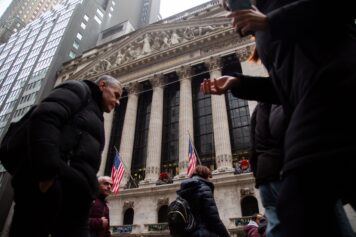By Stephen Kirkland and Vildana Hajric
U.S. stocks extended declines after Fed Bank of St. Louis President James Bullard said he supported raising rates by a full percentage point by July. Treasury yields climbed.
Bullard’s comments followed data showing inflation accelerated to a four-decade high in January, with the consumer-price index reaching 7.5%, more than the median estimate of 7.3% in a Bloomberg survey. Fed swaps now show a full point of tightening over the next three meetings.

The S&P 500 fell to lows of the day and the tech-heavy Nasdaq 100 dropped 2%, the worst performance among major benchmarks. The yield on 10-year Treasuries climbed above 2%, the highest since August 2019, while the rate on the two-year note reached 1.58%, the highest since January 2020.
Bullard’s plan involves spreading the increases over three meetings, shrinking the Fed’s balance sheet starting in the second quarter and then deciding on the path of rates in the second half based on updated data. He said he was undecided on whether the March meeting should begin with 50 basis points.
“Right now, investors are not only worried about what the Fed does on interest rates, but then what impact that will have on growth,” Chris Gaffney, president of world markets at TIAA Bank, said in an interview. Inflation’s hot, he said, but “investors will move toward looking at cash flows and what companies are going to be doing, and I think that’s supportive of the markets.”
The Fed slashed the upper band of its target funds rate to 0.25% at the onset of the pandemic in 2020, matching the lowest level on record, and has kept it there since to foster an economic recovery. The sea of liquidity helped boost stocks, propelling the S&P 500 to successive records through 2021 and into the first days of January. But fears of monetary tightening has sent stocks lower this year, leaving the S&P 500 down about 5% year to date.
“The initial reaction of higher yields, higher front end yields and ‘risk-off‘ for the Nasdaq 100/ARKK type of stocks seems like a good one to fade,” said Peter Tchir, head of macro strategy at Academy Securities. “Maybe I’m being stubborn, but I think this is a number we had to make it through, and now that we have, I think we can see yields grind lower.”
Here’s what others are saying Thursday:
“All else equal, more fuel to the inflation fire should harden the Fed’s resolve to begin raising interest rates at its next meeting in March and introduce quantitative tightening in the months thereafter.” — Jason Pride, chief investment officer of private wealth at Glenmede
“High energy prices and supply issues are stoking inflation but these issues should eventually fade. Of greater concern is that wage pressures are building and the central bank will not want to risk a wage price spiral. Looking ahead though, real consumer spending on discretionary goods and services is likely to cool naturally, as higher energy costs begin to bite.” — Jai Malhi, global market strategist at JPMorgan Asset Management
“Overall, we remain constructive on equities over bonds with a preference for cyclical and value stocks, commodities and commodity-linked equities. One theme that ticks all those boxes is dividend-paying European and U.K. equities which have lagged their U.S. peers and offer the potential for catch-up gains on a total return basis.” — John Leiper, chief investment officer at Titan Asset Management
Meanwhile, oil rose as soaring U.S. consumer prices prompted traders to pour into commodities as a hedge against inflation.
Here are the main market moves:
Stocks
- The S&P 500 fell 1.6% as of 1:38 p.m. New York time
- The Nasdaq 100 fell 2%
- The Dow Jones Industrial Average fell 1.3%
- The MSCI World index fell 0.8%
Currencies
- The Bloomberg Dollar Spot Index was little changed
- The euro rose 0.3% to $1.1463
- The British pound rose 0.5% to $1.3600
- The Japanese yen fell 0.3% to 115.89 per dollar
Bonds
- The yield on 10-year Treasuries advanced seven basis points to 2.01%
- Germany’s 10-year yield advanced seven basis points to 0.28%
- Britain’s 10-year yield advanced nine basis points to 1.52%
Commodities
- West Texas Intermediate crude rose 0.1% to $89.79 a barrel
- Gold futures were little changed
More stories like this are available on bloomberg.com.




